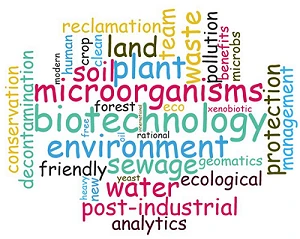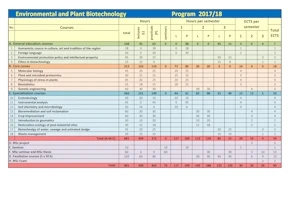Environmental and Plant Biotechnology
ENVIRONMENTAL and PLANT BIOTECHNOLOGY
| Master Degree study (M.Sc.) |
Full time Program starts: October 2021 No tuition fee for students from Poland, EU and EFTA countries |
3 semesters (1 year and 6 months) |
|
Environmental and Plant Biotechnology (EPB) is a unique Master's Degree program offered in English for students from around the world who wish to be in the forefront of biotechnological developments. EPB gives the opportunity to get the knowledge and skills in modern methods and techniques of environment preservation, reclamation and use in a sustainable manner for human benefits. Biotechnology, combining the newest scientific achievements, technological advancements and the application of living organisms like microbes and plants, gives invaluable and unlimited possibilities to interact with the environment in a responsible manner, the environment we all live in and benefit from. |
 |

Description
EPB students get interdisciplinary knowledge and skills based on proficiency in biological, agricultural and technical sciences extended to advanced levels in the fields related to the use of biotechnology in solving environmental problems, in particular they learn:
- genomics, proteomics and regulation of gene expression,
- physiology of plants and microorganisms exposed to stress,
- effect of natural and anthropogenic compounds on organisms' development and degradation of natural environment,
- techniques of microorganism, plant cell and tissue cultures in vitro,
- analytical methods and biotechnologies useful in study plant and microorganism metabolic processes and in environmental protection,
- bioremediation, phytoremediation and physico-chemical methods for environment decontamination,
- biotechnology of water, sewage and activated sludge, waste management,
- reclamation of post-industrial lands,
- biotechnology in crop improvement,
- environmental protection policy,
- protection and management of intellectual property rights.
During lectures, laboratories, trainings and trips, students are acknowledged with processes ongoing in microorganisms and plants at molecular, cell and system levels. They gain the experience and skills in analytical and biotechnological ways to monitor environmental changes, to protect biodiversity and to act for bioremediation of polluted water and reclamation of contaminated and degraded post-industrial lands, including biotechnological ways of sewage utilization and waste management. Biotechnological and conventional approaches of crop improvement for sustainable agriculture will be also addressed. Students also develop teamwork and social skills while learning in international and multicultural communities.

Courses
|
Specialization courses Bioremediation and soil reclamation |
Core courses Genetic engineering |
General education courses Environmental protection policy |
Facultative courses
Students can choose facultative courses that enable to tailor the program of their study to the areas, which they are most interested in.
| Biochemistry Anatomical features of micropropagated plants Antioxidant activity mechanisms in plants Bioinformatics Biological and biotechnical methods of plant protection Cytogenetics Diversity of plant anatomy as habitat adaptation Embryology of flowering plants Flora of brown fields GMO development and assessment techniques Isotopes and antibodies in diagnostics Laboratory practice Manipulations on plant protoplasts and cells |
Molecular phylogenetics Molecular techniques in mycological research Natural resources of chemically degraded areas Phylogenetics and phylogeography in mycology Phytochemicals and microorganisms for biotechnology Plant cell biology Plant genetic transformation Plant genomics Plant virology Sustainable horticulture systems Systematic botany in phytotechnologies Systematics and characteristics of crop plants Tissue cultures for crop improvement Tissue cultures for fruit crops |
| Study program — download | |
 |

Graduate profile
After completing the EPB study program, graduates have comprehensive, theoretical knowledge, skills and competence distinguishing them as competitive candidates in the European labour market. Graduates understand in-depth issues related to the application of modern biotechnological approaches in protection and sustainable use of environmental resources. They have skills to use a range of state-of-the-art analytical and biotechnological methods to monitor and rationally manage environmental quality. In particular, they can be involved in projects concerning environmental protection, biological remediation of polluted water and land, reclamation of degraded areas, sewage treatment, waste management, and plant cultivation and improvement.
Graduates have sufficient professional competence to start up business as an independent entrepreneur, or to be recruited as an employee of administrative units and local governments, workplaces, and other entities. They are prepared to work in industrial laboratories and research institutions utilizing biotechnological approaches. They are also well qualified to continue their education and solve scientific problems within the framework of doctoral studies at universities worldwide.
Graduates of the EPB program are also well qualified to:
- consult industry, farmers, extension specialists, investors and policy makers in formulating appropriate Environmental Protection packages based on biotechnological methods as elements of the environment-friendly agricultural policy,
- play a leading role in integrating multidisciplinary knowledge and skills in the process of enhancing agricultural productivity and ensuring food security at a local, national and global scales,
- be engaged in teaching and training activities at various levels of environmental protection and related issues.

Who can study EPB ?
Undergraduates with BA, BSc., Eng. or equivalent Diploma in life science
The most welcome are undergraduates possessing a Bachelor (BA or BSc.) degree, Engineer (Eng.) or equivalent Diploma in biotechnology, biology, agricultural sciences or environmental protection.
Candidates with a Diploma in other related studies are also strongly encouraged to apply if possess most of the following competences:
- knowledge in biology, chemistry, biochemistry, and basic understanding of maths, physics, biophysics, physiology etc,
- skills on principle methods, techniques and tools used in biotechnology.
Fee
| Fee type | Candidates from | |
| EU and EFTA countries, Switzerland and other eligible persons(1) |
other countries | |
| Enrollment fee | 20 Euro | 20 Euro |
| Tuition fee | 0 | 1000 Euro per semester |
(1) persons from other countries are also eligible to study in Poland without paying a tuition fee if they meet requirements listed in the section 'Rules and mode of enrollment' (for example: non-nationals who have been granted a permit to settle in Poland; non-nationals who have the status of refugee granted in Poland; see more)
Candidates are required to pay enrollment fee of 18 EUR to the following bank account: PL 98 2490 0005 0000 4600 7337 5379; Alior Bank SA, BIC(SWIFT): ALBPPLPW.
Please, add the information for the beneficiary: "EPB admission fee" and name and surname of the candidate.
Recruitment start 13th May 2022




